Soto's Chess Game: Miami-Dade's Chief Judge Grapples With Judicial Vacancies in an Understaffed Circuit
Even as Chief Judge Soto is overjoyed by an influx of judges into the Miami-Dade county and circuit court systems, their very appointments speak to a larger problem within Miami's judiciary.
August 13, 2018 at 06:00 AM
8 minute read
 Chief Judge Bertila Soto equates filling judicial vacancies to a game of chess.
Chief Judge Bertila Soto equates filling judicial vacancies to a game of chess.
For all of the sentimentality and excitement surrounding investitures, their frequency speaks to one of the principal challenges Miami-Dade Chief Judge Bertila Soto has faced in her position: filling the gaps left by judicial vacancies.
Since becoming chief judge in 2013, Soto has overseen 56 investitures.
Her job carries many responsibilities — assigning judges and court officers, implementing a system that addresses all cases and complaints brought before Miami-Dade courts and ensuring the smooth operation of her circuit's day-to-day affairs.
Miami-Dade Will Lose These 14 Judges This Year
But it's the investitures that speak to the toughest challenge — and “one of the best parts” of her job.
“You get to meet the judge and hear the friends that they've selected talk about themselves,” Soto said. “Their families attend and you hear their background about why they became a judge, how they became a judge, their dreams and their struggles, and it gives you an insight that you might not otherwise have. Some of the judges equate it to being their eulogy in life. It's a really beautiful experience and it's a gift to me [and other judges] to get to know our new colleagues.”
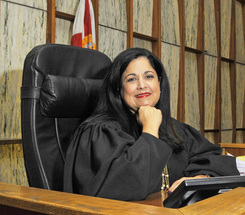 Miami-Dade Chief Judge Bertila Soto. Photo: A.M. Holt/ALM
Miami-Dade Chief Judge Bertila Soto. Photo: A.M. Holt/ALMSoto brings passion to everything she does, whether it's in her position supervising Miami-Dade courts or simply decorating her chambers with wall-to-wall paraphernalia of her favorite college football team, the Miami Hurricanes.
Get to Know Miami-Dade's 15 New Judges
So the chief judge does not mince words when discussing the ongoing attention that judicial vacancies require from her and the courts at large, referring to the constant, strategic maneuvering as a game of chess.
“We always love to have new judges and fresh perspectives. That's part of the process. We know as judges when we run [for office] or are appointed that there's a chance that we won't be a judge the next time,” Soto says. “But it does have an impact, because all of those vacancies last anywhere from 60 to 90 days, and sometimes longer if a judge retires and their seat was up for election.”
22 New County Court Judges in 2 Years
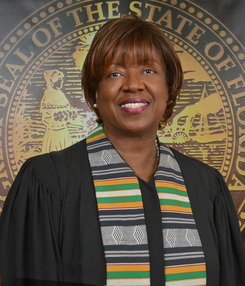 Miami-Dade Judge Teretha Lundy-Thomas
Miami-Dade Judge Teretha Lundy-ThomasSoto cites the example of Judge Teretha Thomas, whose last day on the bench was July 31. However, because Thomas was elected, and the next election will not take place until Aug. 28, her seat will remain empty until the winner of the election takes office in January 2019. This will leave Soto juggling six months' worth of hearings.
Although there are systems — such as the use of senior judges — in place to address occasions such as Thomas' retirement, the circuit has seen a rash of retirements and appointments in recent months. Given Miami-Dade's status as the largest judicial circuit in Florida, and the fourth largest in the United States, caseloads pile up quickly and judicial vacancies can become a sizable conundrum.
“On Aug. 31, Wendell Graham is retiring, which was unexpected. His seat isn't going to election but the appointment process usually takes 90 days,” Soto said.
Sometimes, the appointment process is swift. For instance, within a year, Judge Renatha Francis occupied two spots on the bench. First, in August 2017, Gov. Rick Scott appointed her to the Miami-Dade County Court. By the following June, she had risen to the circuit bench to replace a departing judge.
“When [county judges] get appointed I have a vacancy at the county level going into the circuit level,” Soto says. “One vacancy gets plugged in and another one occurs. By the end of 2018, there'll have been 22 new county court judges in the last two years.”
'Starting Over From Scratch'
Soto is far from the only one feeling the pressure of turnovers in the judiciary.
“Whether it's because a judge is retiring, has resigned or simply is not reelected to the position, you always have a concern that at some point in time the judge is going to change,” said David Weinstein, partner at Miami-based Hinshaw & Culbertson.
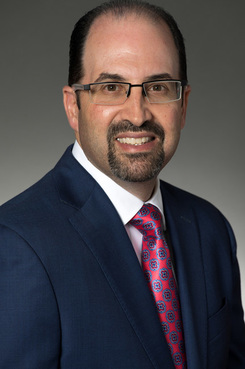 David Weinstein, with Hinshaw & Culbertson in Miami. Courtesy photo
David Weinstein, with Hinshaw & Culbertson in Miami. Courtesy photoWeinstein, who once worked as a prosecutor with the Southern District of Florida and the Miami-Dade County State Attorney's Office, is well-acquainted with the myriad problems such rampant judicial vacancies can cause. Now, as a defense attorney, he is concerned about time lost in bringing new or temporary judges up to speed on the subtleties of each case.
“The danger that you suffer is that you've educated a judge about the intricacies of a case, and then that judge is gone and you're starting over again from ground zero with the new judge,” Weinstein says. “In a criminal case there's speedy trial issues to contend with and the right of the defendant to go to trial. In civil cases things tend to drag on a bit longer because you're litigating about money; in dependency, family court and in probate sometimes it moves even slower.”
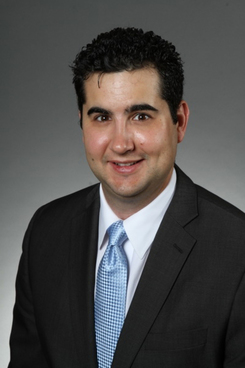 Hayden O'Byrne, K&L Gates, Miami. Photo: Harvey Bilt
Hayden O'Byrne, K&L Gates, Miami. Photo: Harvey BiltHayden P. O'Byrne has a unique view of the process. The commercial litigator with K&L Gates is also the new chairman of the Eleventh Circuit Judicial Circuit Judicial Nominating Commission, which helps the governor narrow the field of candidates hoping for judgeships. As judges move, their rotation can exacerbate the slowdown.
“You're … getting judges that rotate from criminal to civil, but maybe they were a career state attorney or a criminal defense attorney, but they've never done anything civil,” O'Byrne said. “So they're going into civil, they're starting over from scratch, and they just don't know civil procedure. They can learn it, but there's a wrap-up period.”
According to Soto, several aggravating factors compound the problem of judicial vacancies.
“The legislature budgets a certain amount of senior judge days to each circuit … but we've never had enough senior judge days to cover the vacancies,” the chief judge said. “We don't use senior judge days for one-day sick or for vacation. This is purposely for vacancies.”
Plus, a June 2014 ruling by the Florida Supreme Court placed restrictions on the caseload that senior judges can handle to avoid potential conflicts of interest, leaving Soto with yet another chess move to make.
“I think that that's a valid point,” Soto said. ”But by the same token, our senior judges who only get paid $350 a day, when they could be making $400 an hour doing mediation, have chosen to do mediation, and you can't blame them for that.”
'Multifaceted Problem'
The creation of a back-up judge position could help alleviate the fallout of the high court ruling, but Soto anticipates bureaucratic and financial roadblocks.
Plus, some observers say the issue could be even more complicated.
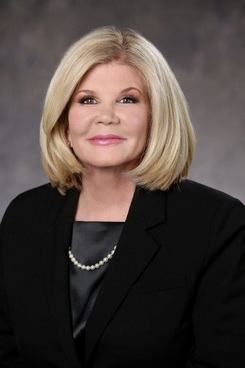 Lee Stapleton, K&L Gates
Lee Stapleton, K&L Gates“It is a multifaceted problem, but it's not a situation that lends itself to throwing money,” said commercial litigator Lee Stapleton, a partner at K&L Gates. “It's not a management issue. It's a very human issue. It's Important whenever possible to have continuity, but no management system or money can stop judicial turnover. … I don't think it's something that you can necessarily fix.”
For the time being, Soto has been deftly moving the pieces on the circuit's chessboard.
“We do the best we can with what we can afford and with what we have,” she said. “You asked me how I do it. It's because everybody is very in-tune to the vacancies and is trying to help out.”
Related stories:
Not Just 'Small' Claims: County Courts Might Soon Handle Cases Up to $50,000
Miami-Dade County Court Judge Steps Down After 24 Years on the Bench
Three Miami-Dade County Court Judges Elevated to Circuit Bench
This content has been archived. It is available through our partners, LexisNexis® and Bloomberg Law.
To view this content, please continue to their sites.
Not a Lexis Subscriber?
Subscribe Now
Not a Bloomberg Law Subscriber?
Subscribe Now
NOT FOR REPRINT
© 2025 ALM Global, LLC, All Rights Reserved. Request academic re-use from www.copyright.com. All other uses, submit a request to [email protected]. For more information visit Asset & Logo Licensing.
You Might Like
View All
Latest Boutique Combination in Florida Continues Am Law 200 Merger Activity
3 minute read
Miami-Dade Litigation Over $1.7 Million Brazilian Sugar Deal Faces Turning Point
3 minute read
Meta agrees to pay $25 million to settle lawsuit from Trump after Jan. 6 suspension
4 minute readTrending Stories
Who Got The Work
J. Brugh Lower of Gibbons has entered an appearance for industrial equipment supplier Devco Corporation in a pending trademark infringement lawsuit. The suit, accusing the defendant of selling knock-off Graco products, was filed Dec. 18 in New Jersey District Court by Rivkin Radler on behalf of Graco Inc. and Graco Minnesota. The case, assigned to U.S. District Judge Zahid N. Quraishi, is 3:24-cv-11294, Graco Inc. et al v. Devco Corporation.
Who Got The Work
Rebecca Maller-Stein and Kent A. Yalowitz of Arnold & Porter Kaye Scholer have entered their appearances for Hanaco Venture Capital and its executives, Lior Prosor and David Frankel, in a pending securities lawsuit. The action, filed on Dec. 24 in New York Southern District Court by Zell, Aron & Co. on behalf of Goldeneye Advisors, accuses the defendants of negligently and fraudulently managing the plaintiff's $1 million investment. The case, assigned to U.S. District Judge Vernon S. Broderick, is 1:24-cv-09918, Goldeneye Advisors, LLC v. Hanaco Venture Capital, Ltd. et al.
Who Got The Work
Attorneys from A&O Shearman has stepped in as defense counsel for Toronto-Dominion Bank and other defendants in a pending securities class action. The suit, filed Dec. 11 in New York Southern District Court by Bleichmar Fonti & Auld, accuses the defendants of concealing the bank's 'pervasive' deficiencies in regards to its compliance with the Bank Secrecy Act and the quality of its anti-money laundering controls. The case, assigned to U.S. District Judge Arun Subramanian, is 1:24-cv-09445, Gonzalez v. The Toronto-Dominion Bank et al.
Who Got The Work
Crown Castle International, a Pennsylvania company providing shared communications infrastructure, has turned to Luke D. Wolf of Gordon Rees Scully Mansukhani to fend off a pending breach-of-contract lawsuit. The court action, filed Nov. 25 in Michigan Eastern District Court by Hooper Hathaway PC on behalf of The Town Residences LLC, accuses Crown Castle of failing to transfer approximately $30,000 in utility payments from T-Mobile in breach of a roof-top lease and assignment agreement. The case, assigned to U.S. District Judge Susan K. Declercq, is 2:24-cv-13131, The Town Residences LLC v. T-Mobile US, Inc. et al.
Who Got The Work
Wilfred P. Coronato and Daniel M. Schwartz of McCarter & English have stepped in as defense counsel to Electrolux Home Products Inc. in a pending product liability lawsuit. The court action, filed Nov. 26 in New York Eastern District Court by Poulos Lopiccolo PC and Nagel Rice LLP on behalf of David Stern, alleges that the defendant's refrigerators’ drawers and shelving repeatedly break and fall apart within months after purchase. The case, assigned to U.S. District Judge Joan M. Azrack, is 2:24-cv-08204, Stern v. Electrolux Home Products, Inc.
Featured Firms
Law Offices of Gary Martin Hays & Associates, P.C.
(470) 294-1674
Law Offices of Mark E. Salomone
(857) 444-6468
Smith & Hassler
(713) 739-1250







